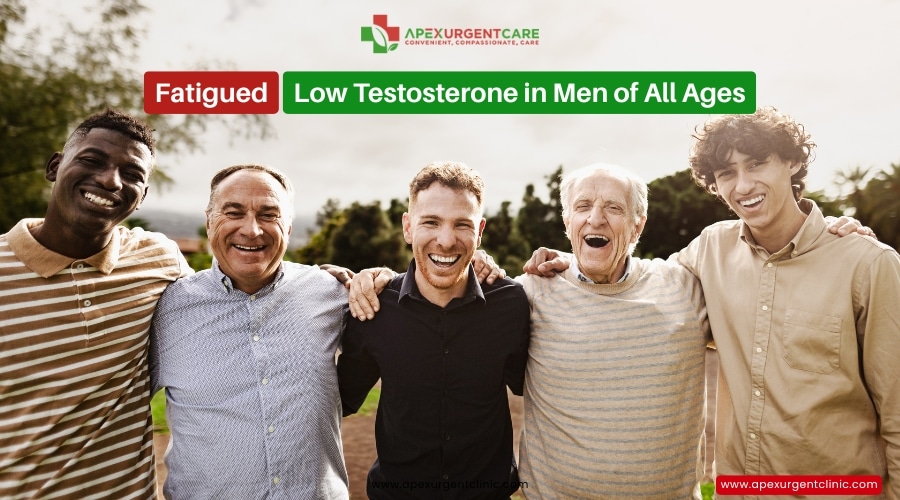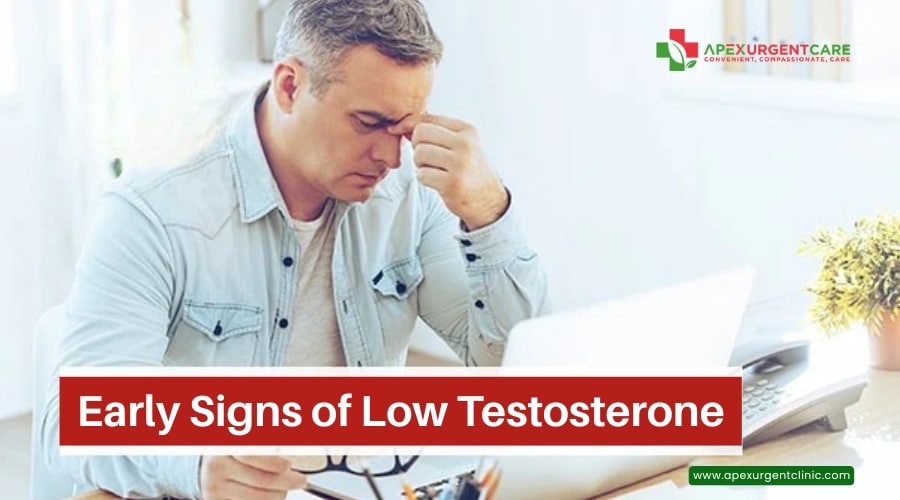
Interestingly, younger men notice emotional and mental symptoms first, such as anxiety, brain fog, or poor sleep, while older men experience physical signs such as erectile dysfunction and decreased bone density.
Remember when you could handle a day of classes, basketball practice, and a night out, then wake up ready to do it all again? Now, just getting through half your to-do list can feel like a marathon. Part of it is age and responsibility, but sometimes it is low testosterone.
At Apex MD Wellness Clinic, we offer Testosterone Replacement Therapy (TRT), which restores vitality and confidence in men of all ages. Before getting treatment, understand how testosterone changes, what symptoms to look for, and when to take action.
Early Signs of Low Testosterone

Testosterone, the hormone responsible for muscle mass, mood, and libido, naturally begins to decline after age 30. However, for some men, that dip happens too soon. According to a 2024 analysis by Selinger and Thallapureddy, the number of people using TRT prescriptions increased by more than 120% among men under 24 between 2018 and 2022—proof that this isn’t an “older man’s” issue.
Early symptoms include feeling drained despite enough sleep, less interest in sex, and finding it harder to focus. You might notice mild physical changes, such as less muscle definition or increased body fat around the waist.
At this stage, a simple blood test can confirm whether testosterone levels are below normal. If they are, our Houston doctor can recommend ways to rebalance your hormones—starting with lifestyle adjustments before moving to therapy if needed.
Learn about testosterone testing and treatment options here.
Mid-Stage Symptoms: When It Starts Affecting Daily Life
If left unchecked, low testosterone can begin to interfere with your everyday routine. You might find it harder to concentrate, feel irritable for no reason, or lose motivation for things you once enjoyed. Physical symptoms may include reduced endurance, slower recovery from workouts, or even mild depression.
Professions with high stress, irregular sleep patterns, or long sedentary hours, such as like truck driving, shift work, or tech jobs, are prone to hormonal imbalance. Habits like excessive alcohol consumption, smoking, or extreme dieting can lower testosterone production.
Late Symptoms: When It’s Time to Act Fast
In advanced stages of low testosterone, symptoms are more severe. Men experience muscle loss, chronic fatigue, anemia, or bone thinning (osteoporosis). Libido can drop, and mood swings feel uncontrollable.
At this point, Testosterone Replacement Therapy (TRT) becomes a medical necessity to prevent further health decline. TRT helps restore hormone levels to normal, improving energy, mood, sexual function, and cognitive performance.
Our Houston doctor will customize a treatment plan, which might include injections, topical gels, or pellet therapy, depending on your test results.
Diet and Lifestyle
Diet and exercise is a natural foundation for healthy testosterone levels. Foods rich in zinc, vitamin D, and healthy fats—like salmon, eggs, and avocados—support hormone production. Regular strength training, managing stress, and enough quality sleep can help maintain optimal levels.
Processed foods, excess sugar, and lack of movement suppress testosterone. Even small changes like cutting back on alcohol and prioritizing workouts can make a noticeable difference.
Is TRT Only for Older Men?
Factors such as stress, poor diet, and environmental toxins are affecting testosterone earlier than ever. The same 2024 study found that 14% of men have used or are using TRT, including many under 40.
Apex MD Wellness Clinic offers individualized evaluations for men of all ages. We consider your lifestyle, medical history, and goals.
Takeaway: Low testosterone isn’t a sign of weakness—it’s a health condition that can be treated. Our Houston doctor and care team will guide you through testing, treatment, and long-term support to regain the energy, strength, and focus.

